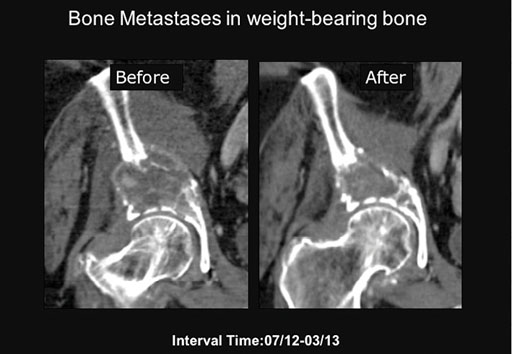Researchers Demonstrate the Effectiveness of MRgFUS to Control Cancer Pain
By MedImaging International staff writers
Posted on 27 Dec 2016
Researchers in Italy have shown that MR-guided high-intensity Focused Ultrasound (MRgFUS) is safe and effective in managing pain in cancer patients, and can reduce the dependence of these patients on opioid pain control medications.Posted on 27 Dec 2016
The results were presented at the annual Radiological Society of North America (RSNA2016) meeting. Clinicians often prescribe opioid medicines for pain relief however patients can become dependent on these medications, and MRgFUS is now being used as a non-invasive and innovative pain treatment method.

Image: One coronal CT image was taken before treatment, and the other eight months afterwards. The images demonstrate that the treatment resulted in de novo mineralization in target area, and partial restoration of cortical bone (Photo courtesy of RSNA).
The researchers from the Sapienza University in Rome (Rome, Italy) used real-time ultrasound or Magnetic Resonance Imaging (MRI) monitoring to guide a transducer and focus ultrasound energy to the targeted area and destroy the target tissue.
The researchers achieved promising results for the management of pancreatic cancer patients. MRgFUS has also been found to be effective at reducing pain in patients with bone metastases and recurrent cervical carcinoma, especially when combined with chemotherapy, and radiation therapy.
Lead author of the study, Susan Dababou, medical student at Sapienza, said, "This population of patients often has a poor prognosis and low life expectancy. The cancer-specific therapy is often very debilitating and pain can be a worsening factor of the general condition of these patients. The patients with pancreatic cancer treated with focalized ultrasound energy by our group were followed for six months and the pain relief lasted for the whole period. There is evidence of at least nine months of pain relief in bone metastases treated with MRgFUS. In comparison with pharmacological treatment, MRgFUS acts on different fronts, ensuring an adequate pain relief, boosting the effect of chemotherapy and radiotherapy, and easing recovery. The compliance of the patients is favored by the noninvasiveness and non-toxicity of the procedure, and unlike pharmacologic therapy it is a single session treatment with mild or no complications."
Related Links:
Sapienza University in Rome














